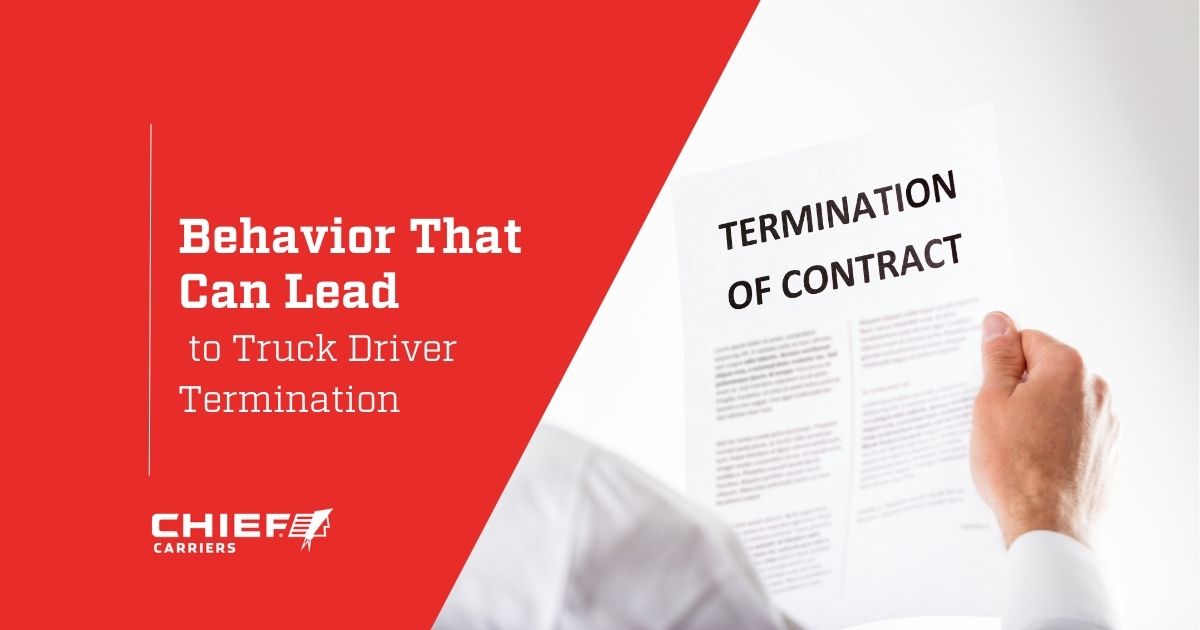Maintaining a successful career as a truck driver requires more than just driving skills. It demands professionalism, responsibility, and adherence to a code of conduct that steers clear of behaviors that can lead to truck driver termination. Understanding truck driver responsibilities and adhering to a strong truck driver code of conduct are essential for longevity in this field.
At Chief Carriers, we are committed to supporting our drivers in building successful careers and offering valuable trucking career advice. On our recent podcast episode of Driven Too Far, we dove into the real-world issues facing truck drivers today. We focused on behaviors that can cause a truck driver to be fired, offering valuable insights for both seasoned professionals and those just starting their trucking journey.

The “Big Three” Truck Driver Violations
Certain behaviors represent serious breaches of professional conduct within the trucking industry and often result in immediate dismissal. We categorize these as the “big three” truck driver violations, and it’s crucial for every driver to understand their impact on their career.
1. Drug and Alcohol Use
The trucking industry operates under a zero-tolerance policy regarding drug and alcohol use. Driving under the influence is not only illegal but also incredibly dangerous. “That’s just a no-brainer,” says Andrew Winkler. “It has absolutely no place in our industry.”
The legal consequences for drivers are severe, and the liability issues for employers are substantial. Prioritizing trucking safety is paramount, and any form of impairment jeopardizes everyone on the road. You’ll often find that many trucking companies do random drug testing to uphold their commitment to trucking safety.
2. Theft and Dishonesty
Theft in trucking can take many forms. It can involve stealing fuel or cargo, but it also includes less obvious acts like “stealing time.”
Falsifying logs, padding expenses, and staying on the clock during unpaid breaks are all examples of dishonest practices that can lead to truck driver termination. Even seemingly minor infractions can have serious consequences.
“If the policy is that you need to take a 30-minute break for lunch, and it’s to be unpaid time, then make sure you clock out of your e-log,” says Winkler. “[Doing otherwise] is technically stealing time from the company.”
Honest representation of qualifications and experience is equally important. Misrepresenting your skills or work history on an application is a form of dishonesty that can have long-term repercussions.
3. Aggressive Threats and Behavior
Professional truck drivers are expected to maintain a courteous and respectful demeanor at all times. Verbal aggression towards dispatchers, supervisors, customers, or the general public is unacceptable.
Winkler emphasizes, “That lack of respect…really is a reflection on you and what kind of person you are as well.” Physical threats and road rage are even more serious offenses.
While it’s understandable that the job can be stressful, resorting to aggressive behavior is never justified. Maintaining composure and acting professionally, even in challenging situations, is distinctive of a successful truck driver.

Slippery Slope Behaviors
In addition to the “big three,” there are other behaviors that, while not always resulting in immediate truck driver termination, can create a “slippery slope.” These infractions can accumulate over time, leading to disciplinary action and, eventually, dismissal.
Absenteeism and Tardiness
Reliability is essential in the trucking industry. Consistently being late returning from home time or failing to communicate schedule changes can disrupt operations. Winkler adds, “If that starts happening too often, then you start to get the reputation of somebody [who’s] not a reliable driver.” These behaviors affect not only dispatch but also other drivers who may have to cover the absent driver’s routes and customers who rely on timely deliveries.
Disrespectful Communication
Professional communication is essential. Yelling, screaming, using profanity, or engaging in other forms of disrespectful communication is unacceptable. “If you can’t have a civil conversation and work through a conflict or a difference of opinion, then maybe trucking is not the right…space for you,” says Winkler.
Ignoring Instructions
Truck drivers are expected to follow instructions from trucking safety, operations, and maintenance personnel. If a driver disagrees with an instruction or doesn’t understand it, the appropriate response is to ask questions and seek clarification, not to simply ignore it. “Take an extra 10 or 15 seconds, ask questions, and be curious,” Winkler advises.
Safety Negligence
Cutting corners on trucking safety is never a good idea. Failing to properly secure loads, ignoring trucking regulations, or engaging in other negligent behaviors can have disastrous consequences. “Don’t ever take shortcuts,” Winkler cautions. “[The regulations] are there to protect you. They’re there to protect the company [and] the general public as well.”
Repeated Preventable Incidents
Minor incidents, such as running off the road, hitting objects, or causing minor damage to equipment, may seem insignificant individually. However, Winkler explains, “A pattern of those over time can be a bigger concern, especially for your safety group.”
Failure to Report Incidents
Honesty and transparency are essential. Failure to report any incident, no matter how minor, can lead to disciplinary action. “Don’t avoid those things. Don’t avoid reporting them,” Winkler advises.
Poor Customer Service
Truck drivers are often the face of the company they represent. Rude or unprofessional behavior towards customers can damage the company’s reputation and lead to lost business. “The shippers are going to call in and turn you in,” Winkler says.
Failure to Deliver On Time
Timely delivery is a crucial aspect of the trucking business. Consistently failing to meet delivery deadlines can damage the company’s reputation and strain customer relationships. “Your…operations [or] your company may tolerate that for a little bit,” Winkler notes, “but…you might find yourself on the list for replacement.”

The Importance of Professionalism
Professionalism extends beyond the cab and following the rules outlined in trucking regulations. “It’s about following expectations,” Winkler says. “It’s about representing the company, the industry, and yourself.”
A professional driver takes pride in their work and understands that their actions reflect on the entire industry. Drivers who consistently demonstrate professionalism and a strong work ethic are the ones who get the best opportunities. They may receive preferred routes, higher pay, and greater respect within the company and the industry as a whole.

Social Media and Reputation
In today’s digital age, social media posts can significantly impact a driver’s reputation. Winkler encourages drivers to be mindful of what they post online and advises, “If you can’t say something nice, don’t say anything at all.”
This doesn’t just apply to direct comments about the trucking industry or specific companies. Even seemingly innocent posts can reveal unprofessional behavior, such as excessive complaining, negativity, or inappropriate photos or videos. Drivers should consider how their posts might be perceived by others and strive to maintain a professional online presence.
Winkler also emphasizes the importance of mentoring the next generation of drivers and using social media as a platform for positive engagement. Sharing helpful tips, offering encouragement, and promoting the positive aspects of the trucking profession can contribute to a stronger and more respected industry.

Building a Positive Reputation
Building a positive reputation takes time and effort, but it’s an investment that pays off in the long run. Safety is the top priority, and maintaining a clean driving record and avoiding negative behaviors are crucial for career longevity. Ultimately, a driver’s reputation is their most valuable asset, influencing opportunities, earning potential, and overall job satisfaction.
At Chief Carriers, we value professional drivers who are committed to safety, integrity, and excellent customer service. We’re here to help you be the best driver you can be. Listen to the rest of our Driven Too Far podcast for more truck driver tips.

